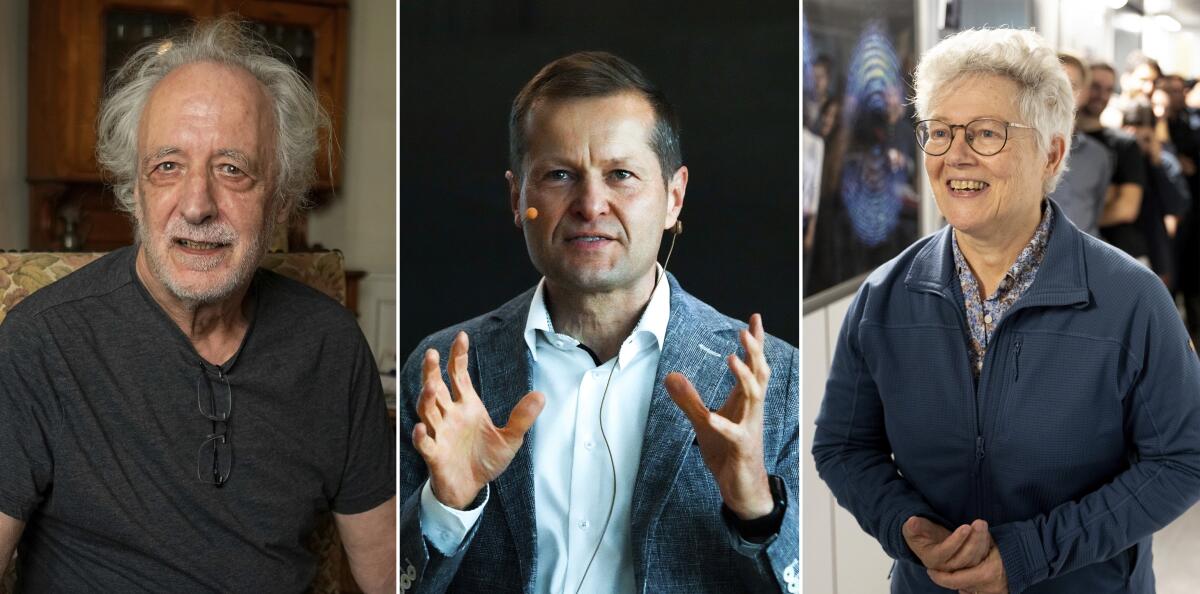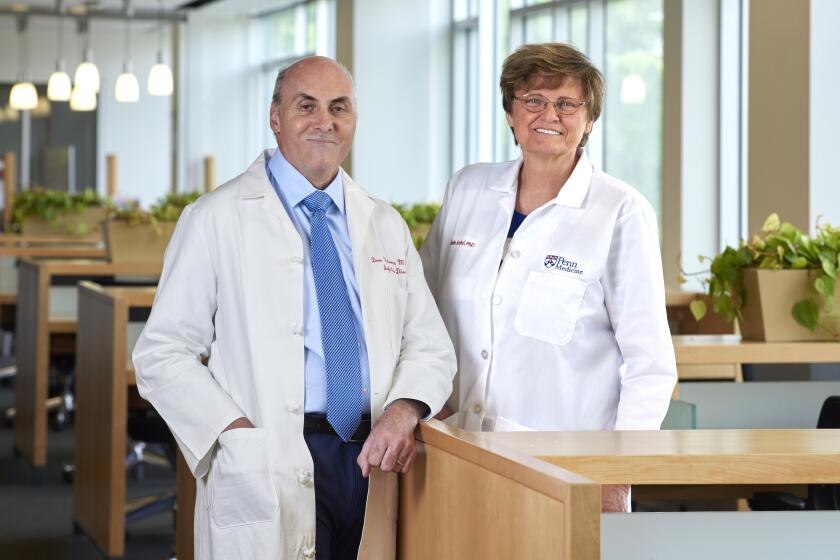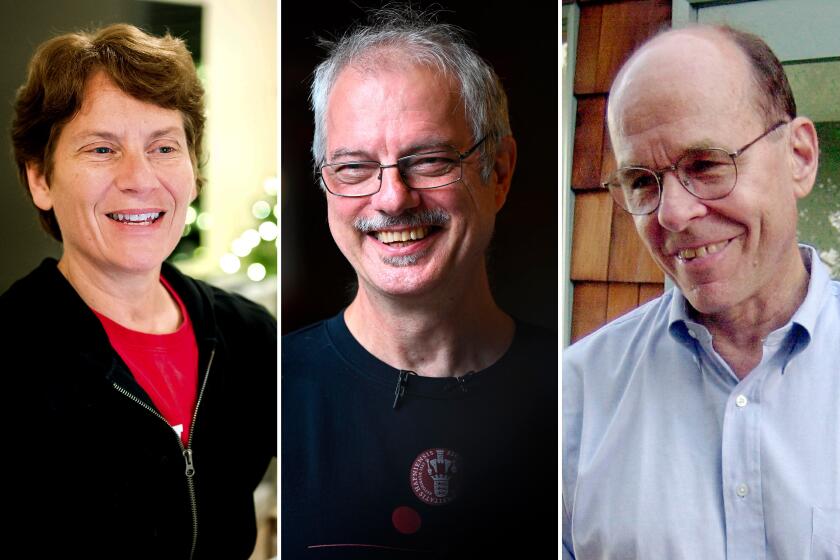3 scientists win Nobel Prize in physics for glimpsing electrons during split seconds

- Share via
STOCKHOLM — Three scientists won the Nobel Prize in physics Tuesday for giving us the first split-second glimpse into the super-fast world of spinning electrons, a field that could one day lead to better electronics or disease diagnoses.
The award went to Pierre Agostini, emeritus professor at Ohio State University; Ferenc Krausz of the Max Planck Institute of Quantum Optics and Ludwig Maximilian University of Munich in Germany; and Anne L’Huillier of Lund University in Sweden. They were recognized for their study of the tiny part of each atom that races around the center and that is fundamental to virtually everything: chemistry, physics, our bodies and our gadgets.
Electrons move around so fast that they have been out of reach of human efforts to isolate them. But by looking at the tiniest fraction of a second possible — an attosecond, which is one-billionth of one-billionth of a second — scientists now have a “blurry” glimpse of them. That opens up whole new sciences, experts said.
“The electrons are really the workforce in everywhere,” Nobel Committee member Mats Larsson said. “Once you can control and understand electrons, you have taken a very big step forward.”
The three honorees’ experiments “have given humanity new tools for exploring the world of electrons inside atoms and molecules,” according to the Royal Swedish Academy of Sciences, which announced the prize in Stockholm. They “have demonstrated a way to create extremely short pulses of light that can be used to measure the rapid processes in which electrons move or change energy.”
At the moment, this science is about understanding our universe, but the hope is that it will eventually have many practical applications.
Nobel Prize winners Katalin Karikó and Drew Weissman harnessed messenger RNA, an advance that led to the Pfizer and Moderna COVID-19 vaccines.
“Attosecond science allows us to address fundamental questions such as the time scale of the photoelectric effect for which ... Albert Einstein received the Nobel Prize in physics in 1921,” said Eva Olsson, chair of the Nobel Committee for Physics.
L’Huillier, 65, is only the fifth woman to win a Nobel in physics. She was teaching a class when the call notifying her of the prize came.
“I was very concentrated, forgot about the Nobel Prize and tried to finish my lecture,” L’Huillier told the Associated Press. She finished the class a little early so she could speak live at the news conference announcing the prize at the Royal Swedish Academy of Sciences in Stockholm.
“This is the most prestigious and I am so happy to get this prize. It’s incredible,” she said during the news conference. “As you know, there are not so many women who got this prize, so it’s very special.”
The three researchers won the Nobel Prize for pioneering an ingenious tool for building molecules and inventing the field of ‘click chemistry.’
Agostini was in Paris and could not be reached by the Nobel Committee before it announced his win.
“I haven’t had a telephone call from the committee. Perhaps it’s not true. I don’t know,” he told the AP, laughing. “I think the committee is looking for me in Columbus,” home of Ohio State University.
“There are certainly younger people who would have appreciated it far more than me,” the 82-year-old joked. “It’s good, but it is a bit late for me.”
But, he added, “I don’t think I would have deserved it more earlier!”
Krausz, 61, told reporters that he was bewildered.
“I have been trying to figure out since 11 a.m. ... whether I’m in reality or it’s just a long dream,” he said.
The call from the Nobel Committee said “no caller ID,” and Krausz usually doesn’t answer those calls, but this time, he said, “I thought I’d try it and then it became clear that I can’t hang up so quickly this time.”
Last year, Krausz and L’Huillier won the prestigious Wolf prize in physics for their work, sharing it with University of Ottawa scientist Paul Corkum. Nobel Prizes are limited to only three winners, and Krausz said it was a shame that it could not include Corkum.
To understand how an electron travels, the scientists had to look at an extremely short time period — the attosecond — just as a photographer uses a quick shutter speed when photographing a hummingbird. But even when they “see” the electron during that tiny fraction of a second, there’s only so much they can view.
“You can see whether it’s on the one side of a molecule or on the other,” L’Huillier said. “It’s still very blurry.”
“The electrons are much more like waves, like water waves, than particles, and what we try to measure with our technique is the position of the crest of the waves,” she added.
Start your day right
Sign up for Essential California for the L.A. Times biggest news, features and recommendations in your inbox six days a week.
You may occasionally receive promotional content from the Los Angeles Times.
L’Huillier said her research shows how important it is to work on fundamental science regardless of future applications, because she spent 30 years on it before possible real-world uses became more apparent.
The physics prize came a day after American scientists Katalin Karikó and Drew Weissman won the Nobel Prize in physiology or medicine for discoveries that enabled the creation of mRNA vaccines against COVID-19.
Last year, three scientists won the physics prize for proving that tiny particles could retain a connection with each other even when separated. The phenomenon was once doubted but is now being explored for potential real-world applications such as encrypting information.
The Nobel announcements continue with the chemistry prize Wednesday and the literature prize Thursday. The Nobel Peace Prize will be announced Friday and the economics award Oct. 9.
The prizes carry a cash award of 11 million Swedish kronor ($1 million). The money comes from a bequest left by the prize’s creator, Swedish inventor Alfred Nobel, who died in 1896.








